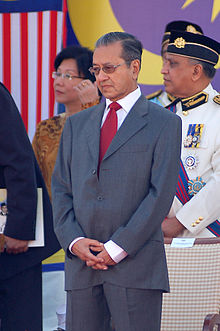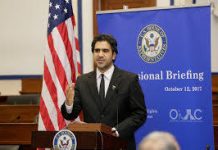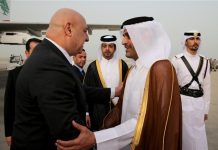Erdogan: Russia could lose Turkey’s friendship
Agencies/Tuesday, 6 October 2015/Turkish President Recep Tayyip Erdogan on Tuesday warned Russia against losing Ankara’s friendship, after Russian warplanes twice violated its airspace near the Syrian border. “If Russia loses a friend like Turkey with whom it has a lot of cooperation it is going to lose a lot of things. It needs to know this,” Erdogan said in Belgium at a press conference alongside Belgian Prime Minister Charles Michel broadcast on Turkish television. In his toughest remarks yet against Russia in the current crisis, Erdogan accused Moscow and its ally Iran of working to maintain the “state terror” of Syrian President Bashar al-Assad. His comments came after Russian warplanes twice violated Turkish airspace at the weekend during Moscow’s bombing campaign in Syria aimed at bolstering the Assad regime.
“It is of course not possible to remain patient about this,” said Erdogan, referring to the incursions into Turkish air space. Erdogan, whose country is NATO’s only majority Muslim member, applauded the reaction of the alliance to Russia’s actions. The NATO allies said Monday they “strongly protest” the violations by Russia and noted the “extreme danger of such irresponsible behavior.”“An attack on Turkey is an attack on NATO, this needs to be known,” said Erdogan, referring to Article 5 of the NATO Treaty that states an attack on one ally is an attack on them all. Russia accuses NATO of using Turkish incursion. Meanwhile, Russia’s NATO envoy said on Tuesday he thought the military alliance was using the accidental incursion of a Russian plane into Turkish airspace to distort the aims of Moscow’s air campaign in Syria, according to the TASS news agency.
“The impression is that the incident in Turkish airspace was used to plug NATO as an organisation into the information campaign waged by the West to distort the aims of the operations carried out by the Russian air force in Syria,” Alexander Grushko, Russia’s NATO envoy, was quoted as telling reporters in Brussels. NATO on Tuesday rejected Moscow’s explanation that its warplanes violated the air space of alliance member Turkey at the weekend by mistake and said Russia was sending more ground troops to Syria. (With AFP and Reuters)
The Politics of Lies
Burak Bekdil/Gatestone Institute/October 06/15
http://www.gatestoneinstitute.org/6608/malaysia-tukey-islamists
“There is no more rule of law.” — Mahathir Mohamad, Malaysia’s prime minister for 22 years.
The essential dynamics of the Islamist polity do not much vary from one Muslim-majority country to another: Corrupt, authoritarian leaders who have no respect for ethnic or religious plurality or dissent of any kind, who crack down on the press and legitimize their corrupt governance by frightening Muslims masses with a made-up threat of the clandestine Jew.
A flight from Kuala Lumpur to Istanbul will usually take around 11 hours. All the same, politically, Turkey and Malaysia are not so distant. The Turkish-Malaysian political parallels are crucial in understanding political Islam.
Back in 2013, President (then Prime Minister) Recep Tayyip Erdogan’s chief advisor, Yigit Bulut, said that he would be “willing to die for Erdogan.” He added: “There are millions like me.” The statement was not shocking news in a country where Erdogan fans had the habit of walking around in shrouds — in expression of their willingness to die for the supreme leader.
Two years later, the same leader-fetish has emerged in Malaysia. Rizuan Abd Hamid, a local leader in Kuala Lumpur of Malaysia’s ruling party, UMNO (United Malays National Organization), said that he was willing to fight for Prime Minister Najib Razak “until his last breath.”
Turkish President Erdogan’s chief advisor, Yigit Bulut (left), says he’s willing to die for his boss. Rizuan Abd Hamid (right), a local leader in Kuala Lumpur of Malaysia’s ruling party, says he’s willing to fight for Malaysian Prime Minister Najib Razak “until his last breath.”
In 2013, Erdogan’s government was badly shaken by two events. In the summer, millions of secular Turks took to the streets to protest the government’s increasingly authoritarian and Islamist practices. In December, countless audio leaks, police reports and indictments unveiled massive corruption involving Erdogan, his family, four government ministers, high-ranking bureaucrats and Erdogan’s business cronies.
Two years later, thousands of Malays are protesting Najib under a campaign named Bersih (“clean”) — a loose coalition of non-governmental organization that demand electoral reform. In July, the Wall Street Journal reported that nearly $700 million had been deposited into Najib’s bank accounts shortly before elections in 2013. The money is linked to a government-owned investment company, 1MDB whose dealings are now being probed in Switzerland.
In 2013, Turkey’s pro-government media and AKP party loyalists falsely claimed that the corruption allegations against them Prim Minister Erdogan were being masterminded by the Jewish lobby (among other foreign groups). In Malaysia, one party leader said that the money found in Najib’s account would be used in a political campaign against an opposition party, which he falsely claimed was backed by “clandestine Jews.”
In Malaysia, a government agency suspended the printing licenses of two newspapers, and now the government is considering curbs on social media. “There is no more rule of law,” said Mahathir Mohamad who was Malaysia’s prime minister for 22 years.
In Turkey, hundreds of journalists critical of Erdogan have been intimidated, prosecuted or have lost their jobs. Most recently, state prosecutors launched a probe into the country’s most influential newspaper, Hurriyet, allegedly for making terrorist propaganda.
UMNO has led coalition governments in Malaysia for six decades. It remains the most popular political party among ethnic Malay Muslims. Erdogan’s Justice and Development Party (AKP) has been Turkey’s most popular party since it joined the political race in 2002. Its voters are mostly conservative Muslims.
In a 2013 speech at a United Nations forum, Erdogan said that Zionism is a “crime against humanity” and likened it to anti-Semitism, fascism, and Islamophobia. In the same year, Erdogan, along with Iran’s supreme leader, Ayatollah Khamenei and UN official Richard Falk, was on top of the Simon Wiesenthal Center’s annual list of the top 10 anti-Semitic and anti-Israel slurs.
The Malay response to Erdogan came with some delays. Last month UMNO party bigwig Rizuan Abd Hamid expressed pride in that “UMNO is one of the few governments that fight the Jews… other Asian countries have already been defeated by the Jews; Singapore is done, Thailand is done, Philippines is done, Indonesia is almost done for, but Malaysia has been protected by Datuk Seri Najib [Prime Minister Razak].”
Hardly any of this is surprising. The essential dynamics of the Islamist polity do not much vary from one Muslim-majority country to another, despite deep cultural, ethnic and linguistic differences: Corrupt, authoritarian leaders who have no respect for ethnic or religious plurality or dissent of any kind, who crack down on the press and legitimize their corrupt governance by frightening Muslims masses with a made-up threat of the clandestine Jew.
Few Turks could point to Malaysia on a map of the world. But most would sympathize with their “Malay brothers.” It must be a pure coincidence that Turkish Prime Minister Ahmet Davutoglu’s official curriculum vitae proudly mentions: “In 1990 he became an Assistant Professor at the International Islamic University of Malaysia where he established and chaired the Political Science Department until 1993.”
**Burak Bekdil, based in Ankara, is a Turkish columnist for the Hürriyet Daily and a Fellow at the Middle East Forum.




















